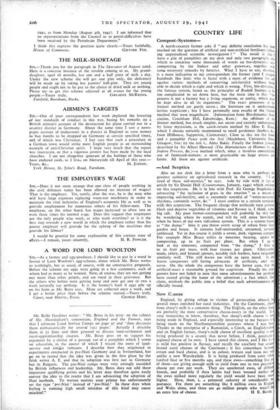THE EMPLOYER'S WAGE
Sot,—Does it not seem strange that one class of people working in the -civil defences today has been allowed no increase of wages? That is the employer. Yet, surely, after the war, he is the man who will have large expenses replacing worn-out machinery in order to maintain the vital industries of England's economic life as well as to provide employment for numerous others of his fellow-men. The employee, on the other hand, has wages increased to often two or
• even three times his normal wage. Does this suggest that employees are the only people who work, or who work overtime? or is it the first step towards a new world in which the employee rather than his poorer employer will provide for the upkeep of the machines that provide his labour?
I would be grateful for some explanation of this curious state of
affairs.—I remain, yours sincerely, H. R. FOWLER.


































 Previous page
Previous page